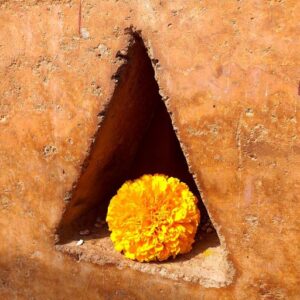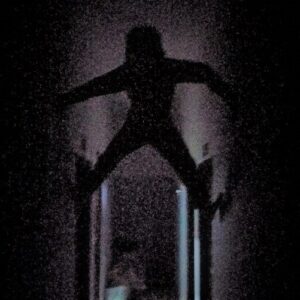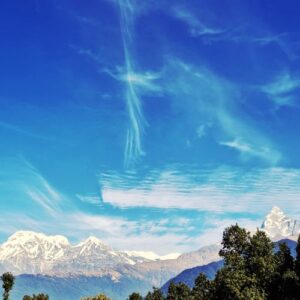The day expired in rouge. Throngs of whistling fork-tail birds weighed the trees. The windows became black mirrors and faces watched back. Out there lay stillness from human centrism. Things were beginning to get unsettling as sepia grips the landscape and the forest transmutes into a haunting neighbour.
Shadows of dismembered branches thrust deep into the ground to prop new life, stood stoic like haggard limbs beneath the flower moon. Tender tendrils of beans and pumpkin coil their way around the blackened stumps and stalks of corn, their grip at first soft and uncertain, then tight and persistent. Their expanse hovers over the small and delicate but not without blossoms. Darker forests lay beyond a few strides from the earth walls, harbouring a solitary tiger that hunts for a desperate feed from time to time – a dog or a calf or a deer. It is often shared how piercing the gaze of the majestic mammal is when projected from a single light beam of a passing motorist, sometimes chilling enough to detour their journey. Our land, once a part of their habitat brings rare visitation. Their fathomless growls heard give conversation for the following day and the search for evidence for fresh paw prints becomes detective play. What occurs beyond the periphery is unknown for there is little courage to venture when night falls. The village redraws quietly into submission, knowing it is time for a hunt and meal for the other inhabitants.

The divide was once not there. Time passes. Trees become stumps and rough edges and shapes take over for paddy cultivation. The land sent many packing deeper into the heart of the forest but remained home to frogs, snakes, rodents and a small aquatic life. As more human eyes lay upon the land, the divide transcends into a play of lines – from the nip of a graphite pencil to the tip of a mouse to the nozzle of a printer. A broad singular line stares back. Glaringly. The life of the line sucked out in a blink of black ink imprinted on a dead bleached sheet of a trunk. Economics from the habit of human centrism takes over. Life-giving trees supporting thousands of fauna and flora extracted from these days none know where. My mind disarrayed with questions give no answers. I fall asleep asking who the predator truly is.
Stirred in predawn, the song of insects pierces and penetrates silence. A cacophony of sound production engineered from the 6-legged companions played in the background:
Rub rasp rattle.
Clip click crackle.
Sweep swish shuffle.
Tweet twirl twitter.
Crickets rubbed the structures of their wings. Grasshoppers stroke their hind legs against their forewings. Katydids rasped together their ridged forewings. Cicadas flexed their muscles and buckled their ribs onto one another. Their act of stridulation in range of frequencies that change with the rise and fall of temperatures call upon their female counterparts for a night of courtship.

A digression: The interior landscape breeds 2-legged specimens with similar characteristics that are inclined to domestic qualities and ancestral monkeying locomotion.

The village was quiet. Only the insects kept company with their mad orchestration. On the long table laid an organised clutter of drawing materials and a laptop falling asleep not quite wanting to cooperate with its user. There was effort to make sense of scribbles on scraps of sheets. The lines drew forth with obtuseness of inanimate shapes, flat and grainy, submitting to forms, undulating through layers of transparent butter paper, spreading through lengths of unexplored space. The faint articulation appears and disappears. The physical and the perceived refused to meet, tugging from all directions. The mind was agitated and patience wore thin. The sheets were incoherent and indigestible. There were no walls no windows no doors. Only a fragment of a muddled head. The laptop snoozed away.
Twilight made its exit not without time.
The gaze turned outwards.
The brooding hills began to show themselves. The land lay bare and muted in clean air exhaled by the forest. I felt the first ray of sun struggling to break through and watched the sky transform into tinctures of amber. Time ticks quickly. The camouflaged roach senses it is time to retreat. The beetles want out. The nocturnal companions shy away. Rose shimmered beyond the ridges proposing night to sleep. China blue dragonflies circled and the slight lift of the forest wind shifted the landscape, scuttling in from the south an archipelago of monsoon clouds.
The air smelled of rain. And rain came. The droplets were small and slant, the wind chilled and clammy. The prelude was short. The clouds hold not its weight and wept, drenching all beneath till it could weep no more.
In increments of gray, a serpentine of mist engulfed the village inviting itself, permeating everything and everywhere. One by one the silhouette of trees vanished. Shapes slurred together and separated. Trees reappeared and disappeared again. The whole taken apart in teasing cotton leaving fragments of the landscape in visual skew. Mist came floating low and slow through the hills hovering lightly above the ground where sky and earth gradually become one. Vapouring and blinding in its ghostly ancient ways. And there I stood feeling it through and through, a little shiver upon its light touch, infused in and out like an arcane transparent cleansing ritual. The little cells were tickled with glee. I succumbed to the mystery of such beauty arising from the blur and slur, sauntering in mental lassitude. The white lingers like a fresh canvas void of paint and emotion. Washed out like clean linen, its old scent dissolved. The eye lost in rainbows of grey. The ear opens wider to the calls of wet feathery plumes.

Squat and silent save for the shuffling of her feet in soil, she did not look up nor speak. Her scent on the wind stifles of mustard seed oil. Her stained teeth, her mud-caked feet, her hardened hands clutching a sickle with an aged doko basket strapped on her back supported with a namlo headband around her forehead. I watched her upright sturdy posture and watched the many other sturdy women in the village, clad in bright reds and pinks, toiling the fields. I heard the purr of an old engine uncoil from out of the horizon and trailed off like a broken chord from the wheels of the milkman’s jeep. I spot the stonemasons collecting their tools and wheeling in the rocks, the barrows thick with mud. They tap, chisel and carve in their quiet niche like industrious woodpeckers. The bricklayer’s assistant tosses the bricks up a floor to the accurate grip of the bricklayer who receives them meticulously and piles them up deftly. The sky soared with beauty.
In the hope of taming a fringe of the wilderness to imprint our aesthetics on the ground, a line of bushes and saplings were struck out of life. It felt wrong and misaligned. But how mistaken it was to be dispirited by the barrier we had stamped between our dwelling and the forest. Realisation came slow but vivid. The barrier cannot be tamed. The wind knows no master and blows life into every creek and crack. The sunbeam nurtures all with warmth. The rain knocks on the kernels unceasingly. The seedlings are teased into sprouting. New life abounds everywhere. Our actions are temporal.
We are in a place that never ceases to grow, to listen, to observe, to find the balance of cohabitation, to celebrate inter-connectedness with all that lives in it. We are in a place where we may have to pause habitual comforts to open new doors. Bending old ways to prod new paths. Expanding our boundaries in ways we have yet to set foot.
The monsoon rain, an enchantress, dissolves the muddle to let us see afresh and to extend the reach of our imagination into other ways of being. She is to remind us of our place in the grand scheme of things, to grant a new perspective, to transcend and to become an extension of a shared world that exists in its own right. Our use of it must come with deep reverence. It is to remind the sense of smallness of human history against the story of the planet, and our own impermanence.



